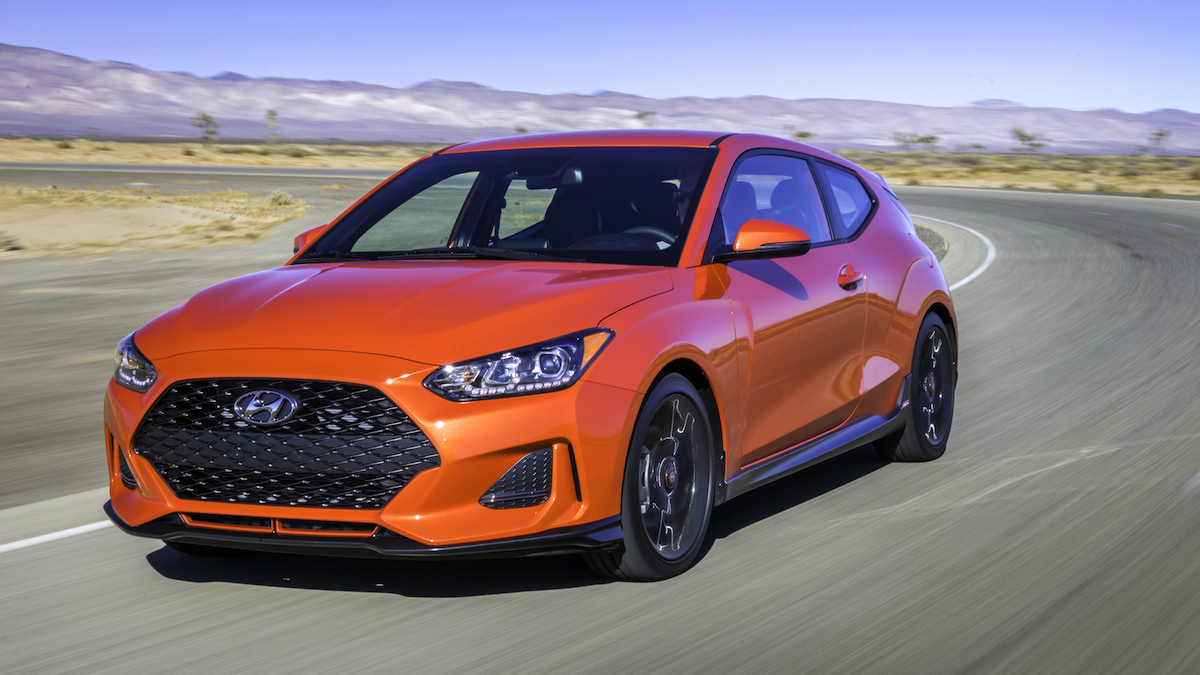Welcome to Critic’s Notebook, a quick and off-the-cuff car review consisting of impressions, jottings, and marginalia regarding whatever The Drive writers happen to be driving. Today’s edition: the 2019 Hyundai Veloster Turbo R-Spec.
Base Price (Price as Tested): ($23,785) $23,785
Powertrain: 1.6-liter turbocharged inline-four; 201 horsepower, 195 pound-feet of torque; six-speed manual transmission; front-wheel drive
EPA Fuel Economy: 26 mpg city / 33 highway
Curb Weight: 2,816 pounds
0-60 MPH: 6.2 seconds
Cargo Space: 20 cubic feet
Quick Take: A value-packed, surprisingly fun-to-drive entry in the sport hatchback segment, although a few calibrations shy of matching class leaders’ performance.

One Big Question: Does the Veloster finally deliver the performance and fun its looks promise?
I drove the Hyundai Veloster for the first time in 2011. The new-for-2012 model was making the media rounds, and I was percolating with anticipation. Could this kooky little lump be the spry, subcompact hatch I’d pined for?
Negative. The first-gen model’s outward quirk didn’t extend to its driving dynamics. It was sluggish, milquetoast, and took corners like a Simmons Beautyrest stuffed with Chicken à la King. And those, as they used to say in the Catskills, were its good points.
I was crushed. I chalked up the Veloster—which likewise didn’t live up to the promise of speed in the name’s Latin root—as a reasonable, functional economy hatch, and went on with my search. That search came to a fruitful conclusion when I met a Ford Fiesta ST for the first time on a California B-road. Here was a tiny hatchback with crackling driving dynamics, an exciting powerband, and well-tuned steering. If only Hyundai had followed the same engineering brief, especially now that Ford is discontinuing the Fiesta ST in the U.S.

And then, Hyundai introduced an upgraded 2019 Veloster Turbo, built with the same toolkit as the similarly-improved Elantra GT. It looked like that car I drove in 2011, retaining the asymmetrical doors and oddly-canted roofline, but the body was more rigid, the suspension had been reeled in with larger antiroll bars and a compliant damper tune, the steering was, well, better, and the new, 1.6-liter turbo engine was torquey and flexible. Most notably, a multilink independent rear suspension had replaced the original Veloster’s torsion beam.
With all of these changes, the new Turbo was more capable, had a more premium road feel, and most important, it banished the sour taste I had of its predecessor to the ash heap of memory. Now, on the optional Michelin Pilot Sport 4 summer tires, this Veloster Turbo could take a firm set in a corner, hang on like a suction cup through throttle roll-on, and squirt past the apex like three-quarters of a Volkswagen GTI.

Yes, it seemed Hyundai had reverse-engineered our perennial German favorite, and imparted some of the GTI’s ride quality and meaty charm, if not the sharpness and holistic performance profile, to the Veloster Turbo. Indeed, this was a good step, leaving room for the 275-hp “N” version, which the company released this year.
That brings us to the Veloster Turbo R-Spec edition, a mild-sport package that adds a satisfying, short-throw B&M shifter to the six-speed manual, a more aggressive exhaust, a set of Michelin Pilot Sport 4s over 18” wheels, and changes to damper rates. Those changes accompany cosmetic add-ons including a blacked-out grille, rear spoiler, and cloth seats with checkered-pattern stripes. The overall effect is tasteful, with the merest of nods to traditional sport-compact visuals.

On the road, thanks to the new, 1.6-liter “Gamma” turbo four, the R-Spec can mix it up with a Honda Civic Si or Fiesta ST without giving ground; Hyundai puts the R-Spec ahead of both of those cars in 0-60 time (6.2 seconds). The engine is punchy and flexible, and while it’s happy to rev past its torque peak, it doesn’t do so with any real enthusiasm. Driving smoothly and under the limit of the sticky Michelins (standard on the R-Spec) delivers the best experience, as the front end washes out first, despite the promised brake-based torque vectoring. Somehow, even with the most enthusiastic trail braking, it’s still a chore to get this thing to slither through corners.
The steering, one of the biggest disappointments of the previous Veloster, is quick, but still lacks on-center tactility. Engineers dialed in some heft beyond center, but while leagues better than previously, the EPS still projects vagueness under cornering loads.

The R-Spec’s interior treatment is classy, and the package includes Hyundai’s typical Infinity eight-speaker sound system, along with Apple Car Play and Android Auto, as well as Hyundai’s BlueLink connected-car system. The standard aluminum shift knob looks great, but heats up in the sun and can cause silver-dollar-sized palm welts.
First-degree burns notwithstanding, the Veloster Turbo R-Spec is a surprisingly fun and well-equipped urban GT that takes on established players for thousands less, making it a solid value proposition. A bit more tuning attention, though, and the next Veloster Turbo R-Spec may make us forget the first-gen car, and this one too, ever existed.

